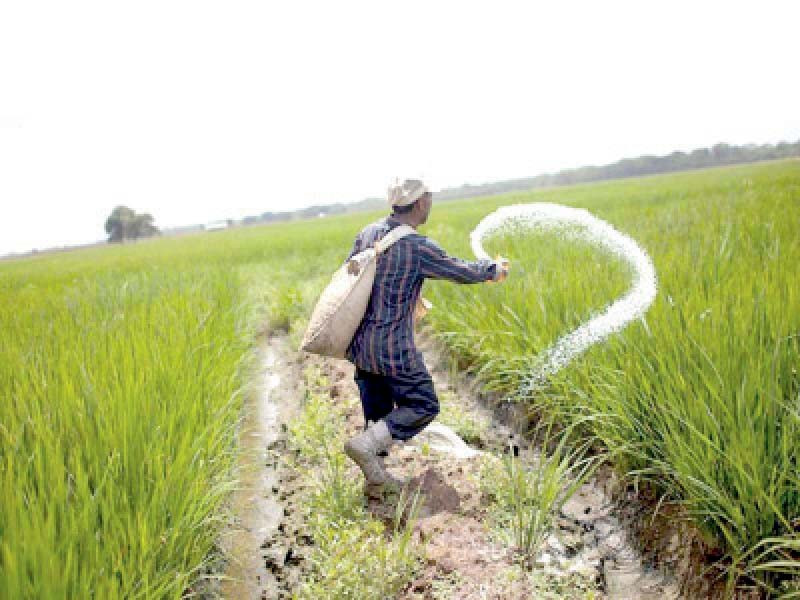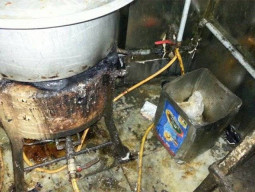
Mukhtiar Soomro, a farmer from in Larkana division, has left no stone unturned in his efforts to procure a bag of urea fertiliser for his wheat crop. On his third visit to the market this week, the farmhand had hoped that things would finally change, but much to his dismay he was once again forced to return home empty-handed. “My crop has turned yellow and their growth is going to be stunted without the urea, but the dealers in the market keep turning me away saying that there is a shortage of stock,” he lamented.
However, Soomro isn’t the only farmer fearing the fate of his crops this season. Dozens of growers like him were seen protesting what they believe is an artificial urea shortage, outside the Larkana Press Club. “The fertilize is not short in supply, it’s rather being black marketed,” claimed one agitated farmer. “The 50-kg bag is being sold for Rs3,000 instead of the actual price Rs1,765. We are ready to get it even at a higher price, but it has gone missing from the entire market,” added another.
The widespread urea shortage that has enraged the province’s farmers has led to various protests across not just Larkana but multiple other districts of Sindh. Some of them have also turned violent, including instances where desperate farmers resorted to intercepting fertiliser trucks in transit and looting them.
“It’s all because of the government’s mismanagement. While we have been made to wait for the fertiliser for the last one month, these influential feudal lords just go ahead and take whatever they want with police protocol,” complained one livid farmer, who led the mob that intercepted a truck transporting urea for Pakistan People’s Party MPA Nawaz Nadir Magsi in Shahdadkot district.
As matters grew hot outside the Larkana Press Club, the local police were eventually called in to fire in the air and disperse the protesting farmers, but so far little has been done to actually assuage their fears and concerns.
According to Sindh Agriculture Research Council Chair Advocate Ali Palh, there are three companies that produce the fertiliser in Pakistan, and cumulatively account for eight million tonnes of urea. “While total consumption of the same is around 6 million tons. The rest of the production is exported to Afghanistan and other countries, but this year, unfortunately, the cartels started hoarding the fertiliser and smuggling it out of the country, which has created an artificial shortage,” the chairperson claimed.
Per Palh, they have filed a petition in the Sindh High Court against the artificial shortage, which he believes is likely to not only impact wheat production but also induce severe food insecurity in Sindh and much of Pakistan. “In lower Sindh especially Hyderabad division, the 50kg bag of urea initially sold for Rs2,300, before jumping to Rs3,300 and now it has climbed to Rs3,400; compared to the actual price of Rs1,780,” told Palh. “The federal and provincial governments are equally inefficient in dealing with this matter. In most of Sindh’s districts, the urea is being distributed to the ruling party’s farmers through deputy commissioners, while the poor growers are left at the mercy of the influential and black market dealers,” added he lamentingly.
Speaking in the same vein, Ghafoor Jat, a landlord from Sanghar district said that farmers like him have to pay Rs5,000 to Rs6,000 extra for urea per acre. “Last year, the price of Engro DAP per bag was Rs4,500. It has now soared to Rs9,500, which is extortionate. Last year the Sindh government had announced Rs2,000 as support prices for 40kg wheat, but it did not implement it and growers were compelled to sell their production at Rs1,400. Now, the skyrocketing price of fertiliser has multiplied their suffering,” he expressed.
Owing to this, Jat believes that all crops including paddy, wheat, sugarcane and cotton have been running losses for the farmers. Speaking in this regard, Sindh Abadgar Board Vice-President Mahmood Nawaz Shah said that fertilizer, especially urea, is a local product and its deliberate shortage can cause up to 10 to 15 per cent of the reduction in this season’s wheat production, which spans over approximately 2.9 million acres in Sindh.
Per Shah, around 29 million tons of wheat production is estimated this year in Pakistan, but it’s unlikely that the target will or can be met under current circumstances, where cartels and mafias have already hoarded and charged rupees six to 12 billion extra from the growers. “It will be a bad omen if this practice continues in the country and concerned government authorities remain silent,” he warned.
Sindh Agriculture Advisor Manzoor Wasan however, blamed the federal government for the overall crises, adding that the price of fertilisers including DAP is lower in Sindh as compared to Punjab and other provinces. “Prime Minister Imran Khan and his team have been shifting the blame on Sindh to cover up their own incompetence, but our department has taken action against people involved in hoarding and profiting from illegal means,” alleged the Agriculture Advisor. “We have set up complaint cells in various districts of the province where growers can lodge their complaints. We have taken action against more than 100 dealers and imposed fines of Rs886,700 so far,” he added while speaking to The Express Tribune.
Published in The Express Tribune, January 23rd, 2022.


1721377568-0/BeFunky-collage-(18)1721377568-0-165x106.webp)















COMMENTS
Comments are moderated and generally will be posted if they are on-topic and not abusive.
For more information, please see our Comments FAQ